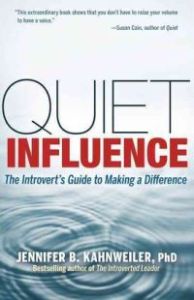
Quiet Influence: The Introvert’s Guide to Making a Difference
by Jennifer B. Kahnweiler
Jennifer Kahnweiler observes “that introverts can be highly effective influencers when they stop trying to act like extroverts and instead make the most of their natural, quiet strengths.” She points out some noteworthy introverted influencers, including Eleanor Roosevelt, Charles Darwin, Mahatma Gandhi, Abraham Lincoln, Rosa Parks, Warren Buffet, Condoleezza Rice, Steven Spielberg, and J.K. Rowling. “Quiet influence is not about talking a great game to win the deal. It is a less understood approach to influence and differs from more ‘out there’ talkative methods.”
The book is organized around six strengths:
- Taking Quiet Time
- Preparation
- Engaged Listening
- Focused Conversations
- Writing
- Thoughtful Use of Social Media
Regarding quiet time, science journalist Sharon Begley wrote in a Newsweek article, “Creative decisions are more likely to bubble up from a brain that applies unconscious thought to a problem, rather than going at it in a full-frontal, analytical assault. So although we’re likely to think creative thoughts in the shower, it’s much harder if we’re under a virtual deluge of data.”
“Preparation helps you to become an expert, prove the value of your proposal, involve others, and increase your confidence… And remember that you engage people precisely by involving them, so the mere act of asking someone for help increases your influence.”
Sales is a career path one typically associates with extroverts. “Yet introverts can make very successful salespeople precisely because they tend to be good listeners… Ironically, a powerful tool for influencing people is silence. Often, a person will talk themselves out of a wrong decision without the listener saying a word.”
“A conversation delivers a different kind of learning than pure listening: you can put ideas out there to test and develop in addition to absorbing the ideas and information others offer.”
“Writing helps you to gain clarity about what’s important to you and what you think and feel about situations… You can then merge you passionate feelings with logic and clarity to form a well-constructed case… You often do a better job influencing others with succinct, to-the-point writing rather than lengthy tomes.” The author explains three types of appeals for persuasive writing: Ethos, Logos, and Pathos. These Greek words refer to Credibility, Logic, and Emotion.
Kahnweiler writes that social media “give those who hesitate to speak in public the opportunity to communicate and collaborate with hundreds or even thousands of people all over the world. For that reason, it may be just the perfect lever for Quiet Influencers now and into the future.” She adds, “Social media can also increase your exposure as a thought leader… Remember that the name of the game is engagement and interactivity. Relying on social media as a platform to present one-way communication simply does not work.”
The author cautions, “Overuse of any strength can translate into a weakness.” For example, “overpreparation sets you up to stick to the script in a way that may not allow you to really hear others’ concerns and points of view.”
Kahnweiler, Jennifer B. Quiet Influence: The Introvert’s Guide to Making a Difference. San Francisco: Berrett-Koehler, 2013. Buy from Amazon.com
Disclosure: As an Amazon Associate I earn from qualifying purchases.